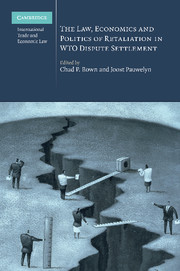Book contents
- Frontmatter
- Contents
- List of tables and figures
- Contributors
- Introduction: trade retaliation in WTO dispute settlement: a multi-disciplinary analysis
- PART I Background and goal(s) of WTO retaliation
- PART II A legal assessment after ten arbitration disputes
- PART III An economic assessment after ten arbitration disputes
- PART IV The domestic politics and procedures for implementing trade retaliation
- PART V Problems and options for reform
- 15 Evaluating the criticism that WTO retaliation rules undermine the utility of WTO dispute settlement for developing countries
- 16 Optimal sanctions in the WTO: the case for decoupling (and the uneasy case for the status quo)
- 17 Sanctions in the WTO: problems and solutions
- 18 WTO retaliatory measures: the case for multilateral regulation of the domestic decision-making process
- 19 The WTO Secretariat and the role of economics in panels and arbitrations
- 20 The equivalence standard under Article 22.4 of the DSU: a ‘tariffic’ misunderstanding?
- PART VI New frontiers and lessons from other fields
- Index
16 - Optimal sanctions in the WTO: the case for decoupling (and the uneasy case for the status quo)
Published online by Cambridge University Press: 26 February 2010
- Frontmatter
- Contents
- List of tables and figures
- Contributors
- Introduction: trade retaliation in WTO dispute settlement: a multi-disciplinary analysis
- PART I Background and goal(s) of WTO retaliation
- PART II A legal assessment after ten arbitration disputes
- PART III An economic assessment after ten arbitration disputes
- PART IV The domestic politics and procedures for implementing trade retaliation
- PART V Problems and options for reform
- 15 Evaluating the criticism that WTO retaliation rules undermine the utility of WTO dispute settlement for developing countries
- 16 Optimal sanctions in the WTO: the case for decoupling (and the uneasy case for the status quo)
- 17 Sanctions in the WTO: problems and solutions
- 18 WTO retaliatory measures: the case for multilateral regulation of the domestic decision-making process
- 19 The WTO Secretariat and the role of economics in panels and arbitrations
- 20 The equivalence standard under Article 22.4 of the DSU: a ‘tariffic’ misunderstanding?
- PART VI New frontiers and lessons from other fields
- Index
Summary
My contribution to this volume falls under the rubric “problems and options for reform.” As shall quickly become clear, however, I am not an advocate of any particular improvements or new approaches. In general, I believe that the WTO dispute resolution system has evolved in a reasonably defensible and satisfactory fashion in response to a number of competing pressures. The overall level of compliance with WTO obligations is high (though by no means perfect), disputes are reasonably modest in number and formal sanctions are comparatively rare. The system is not broken and does not require fixing.
I do not mean to suggest that everything about the WTO dispute system functions perfectly. Certainly, one can quibble with the details of dispute resolution in individual cases, as a number of other contributors to this volume do quite persuasively. No doubt more can be done in cases that proceed to a formal suspension of concessions, for example, to devise better compliance counterfactuals and to measure their trade implications more accurately. But nothing in these thoughtful critiques makes out a case for any fundamental change in the design and operation of the dispute resolution process.
Rather than advocate for particular reforms, therefore, I take this opportunity to raise doubts about some that have been proposed. In particular, the burgeoning commentary on the dispute settlement system includes much criticism of trade sanctions as the “punishment” for breach of WTO obligations. Among other things, critics point out that trade retaliation is economically costly and may harm the nation that retaliates.
- Type
- Chapter
- Information
- Publisher: Cambridge University PressPrint publication year: 2010
- 1
- Cited by

